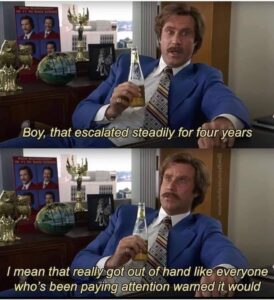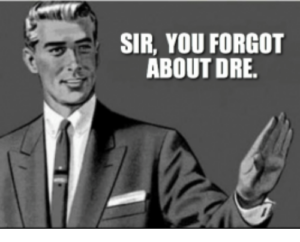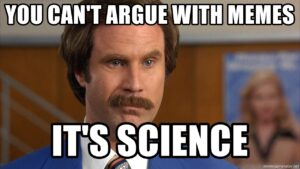If you pay attention, it all works out pretty well
There’s a lot of weird stuff going on. It’s the second week of 2021, and instead of any kind of return to normalcy, it looks like the world is falling apart and the USA is tearing itself apart.
The news seems to be mostly designed to result in people thinking….uhhh…whatever the news people want their listeners to think? Probably? At best, the news outlets are perhaps trying to “fix” things the best way they know how – but that seems to mostly resemble trying to control people into aligning to their version of reality. To think like them, so everyone can be “safe.” Or, they’re trying to get ratings and behaving like a business instead of an organization with a responsibility to inform in a fair, balanced, accurate manner. None of these reasons, or any others that we can think of, are good enough to make inaccurate and downright confusing views of reality as presented by national news outlets not controlling, knowingly dishonest, or awful.
Aside from the news, the two main political parties of our national bipartisan system seem to be doing their best to rip each other apart – and in the process, rip apart any unity that exists in the country. They mostly act like toddlers fighting over an old, worn out blanket that they both have decided is their very most favorite.

Social media, AKA “people talking about stuff on the internet,” is doing its darnedest to implode. More people are talking than listening, and the resulting echo chambers are…well, echoing, at maximum volume. Everyone seems to be getting real offended at anyone who disagrees with them – and not just offended. People are seeing anyone who disagrees with them as an immediate enemy. With COVID, our primary social interaction has moved to online, and when it’s that hostile for dissenting opinions or ideas, something is very wrong.
Also, as of now, the sitting US President is so painful or dangerous to listen to (apparently?) that he doesn’t even get a voice on social media outlets. In addition, lots of other people who just…again, disagree, with the privately-held social media companies are banned. Literally silenced just for having opinions.
As two veterans of divorce, we recognize some of these patterns. It very much feels like the last stages of a relationship ending. Josh got some advice, about a year before his divorce was certain:
As long as you’re arguing, you’re okay – but if you go quiet, it’s just a matter of time.
As a country, we/the US has been arguing violently for about…30 years? We stopped civil discourse… at some point. We both began voting in presidential elections around the time that the results were so close to 50/50 that the winner could not be immediately determined. It’s not acceptable to talk about politics in “polite” circles, because it’s just assumed that we can’t agree and that relationships can’t survive in the face of that kind of disagreement.
You can’t have a political opinion in a public place without risking those relationships, and probably being disowned by at least two people. Any opinion at all is going to result in someone telling you that you’re a bad citizen, and not a “real” American, and also that you very definitely couldn’t possibly be a good person. Depending on where you say it, you will probably also be told that you’re not a good God person, or that you ignore science, or that you’re stupid and your opinions are irrelevant.
We do not accept differing opinions with a listening ear anymore.
Josh saw a video of a family being carted off to jail because they got together for a holiday party and can still hear the screams of their kids. Something is very very wrong.
What the hell happened? What can we do about it? What should we do about it? These are the questions we’ve been asking ourselves, ad nauseum.
We Forgot About Science
 So…remember science?
So…remember science?
Not, “you have to obey our commands or we will lock you up,” or “just listen to the experts without asking questions,” or “I have statistics so you have to do what I tell you,” or…really anything where people tell you what to do.
We’re talking about that thing where people went out and observed stuff, and thought about it intelligently, and then came to conclusions that were backed by empirical evidence. Maybe they had a hypothesis first, or maybe they observed a cool thing and then tried to understand and explain it. A long time ago in a galaxy far far away, people said stuff, and then they went and figured out what they thought, for themselves. And often, they found out that they were wrong in their first, second, and maybe even third assumptions, and that the first and third conclusions were also wrong. But they kept looking, with open eyes. They also argued a lot, got offended, and generally disagreed, all for the purposes of finding the truth.
Science by this definition is, was, and always has been a violent attack on dogma. It doesn’t matter whose dogma, or which dogma, we’re talking about – but often, it was the ruling body and the church (or both). The “let’s figure out what reality is” crowd was perceived as a threat. Sometimes they were exiled. Sometimes they were killed. Often they were mocked and told they were crazy.
Also, sometimes they got rich, and sometimes they gave away their inventions for the good of mankind.
Pursuit of actual reality is one of our highest moral values, because that’s where you can most clearly see God. When teaching Actual Digital Transformation, or any other kind of soul healing, there is no substitute for Trying Stuff Out and Seeing What Happens (TM). We have considered actually patenting our methods, because they are so revolutionary today.
…LOLJK no we haven’t, that was totally some pained sarcasm, because the pursuit of actual reality seems to be painfully and confoundingly revolutionary, most of the time.
We’re sick of being told to “trust” anybody without question. Trust has to be built. We’ve individually, together, and also collectively as a society, been lied to for so long by authority figures that the idea of unquestioning trust of authority is offensive, and frankly ridiculous. Present evidence and let people choose, and allow encourage dissent, or GTFO.

If people are:
- banning other people from saying they’re wrong
- playing into our fear of being alone in order to try to manipulate agreement (“if you don’t agree, you aren’t one of us.”)
- saying anything like, “you should blindly trust us because we’re the experts”
- threatening, including “we’ll put you in jail”
…then they are very much not to be trusted.
We have somehow arrived at this stupid, and dangerous, place where we think that we can’t argue with something if it’s deemed “science.” We cover our ears and run when people say things we don’t like to consider. We can’t handle the thought of being wrong.
Why?
We Forgot about God
There’s something wrong with the world today,
I don’t know what it is.
Something’s wrong with our eyes.
We’re seeing things in a different way,
and God knows it ain’t his.Livin’ on the Edge, Aerosmith
We seem to have forgotten, or perhaps some of us never knew or accepted, that there’s something bigger than all of us. Something so thoroughly Real that it is the authority we must all bend to. Something exists outside of all of us that it is beyond complete human understanding yet is present in every choice and action that we take. Something that if seen directly brings us to tears of joy and sweet sadness. It, He, can be found in being actually loved, or in seeing something so beautiful we cannot speak. It’s in every one of our souls. It’s in the babbling of a madman and in the unquestioning belief of a child, and in the most dangerous thought a person can have.
We forget that we can’t know things perfectly. We forget that we cannot control reality, and that we don’t need to control each other. We forget that any plan can fail, and that good things happen that we did not make happen.
God is behind all of this mess beauty and he’s working hard to break the chains we tend to put on ourselves. We bind our souls, thinking we must create all of the good we have in our lives, and we must keep ourselves safe from our greatest fear: being alone for who we are. That’s behind all of the “one of us” and the tribalism and the exile fears, and it’s why we think we have to agree (or at least pretend to agree) with our peer group, or risk that we ourselves will be excluded, exiled, and forgotten.
We Forgot We Don’t Have to be Afraid
Over and over, the damage we have taken personally, and the things that get in the way of actual good change, can be traced back to people being afraid.
Collectively, we’re all afraid. We’re afraid of losing the power to take care of ourselves. We’re afraid of being rejected, and as such, we’re afraid of whatever other people tell us we should fear.
A lot of those fears are real. People do sometimes hate us for what we believe in. People have lost jobs, and careers, because of economic fallout from COVID and the government’s response. The dollar is losing value at an impressive rate, so money isn’t really safety either (and in fact it never was…). People (us included!) have lost relationships once they decided they were no longer going to be controlled or hide. People hold on to their guns, and their stuff, and their relationships, and their opinions, and their tribes, and they hold on really really tight because they fear what might happen if they lose the things that they think keep them safe. People fear what they will do if they lose what matters to them, or if they lose what keeps them chained.
Angel of death and mercy,
come take me from this cage.
Cause these four walls and iron bars have been
witness to the rage,
of a thousand broken hearts, in chains…In Chains, Shaman’s Harvest
We fight so hard to make laws and control each other in order to keep these chained things, but actually we do more damage to ourselves than to others when we seek to control – when we employ violence, rejection, hatred, disrespect, manipulation, denial of wants and needs, etc. It’s a national tragedy, and a human tragedy. We’ve fought these types of wars for decades – drug wars, culture wars, foreign wars, civil wars – because we thought that they were required in order to be safe.
But…actually, we don’t have to be afraid.
If you pay attention…it all works out pretty well.
We forget, so much, that love is much greater, and much stronger, than fear. It doesn’t always look like that, but…that’s how it lands. We forget that we can just…be ourselves. We forget that we can just be people and love each other and that…actually, life is pretty good.
You won’t be alone. People will like you, no matter your beliefs, statements, opinions, hot takes, or economic status. People will like you regardless of your tribe, your political orientation, or whatever other orientation you have. People will like you because you are a person. Not all people. Sometimes people will double down on being afraid, and they will not be willing to let you be free. But…you still won’t be alone. We know this because simple existence, simple “you are a person,” is all it takes for us to like someone. You are made of God-stuffs, and you are beautiful, and you are worth knowing and loving just because of that. If you’re hungry, I’ll give you from my food. If you’re sick, I’ll help take care of you.
It turns out, the real solutions win, most people are generally trying to be good, and love eventually wins over fear.
So…what now?
Yeah, it’s a valid question. And in some ways, we have literally no idea.
What we do know, or at least are pretty sure of, is that we need to apply the basic, and admittedly very complex, remedy of stop trying to control each other to the nation as a whole.
People have the literal God-given right to be free, and that needs to be respected and honored. We were once the “land of the free and the home of the brave,” and we seem to have en masse forgotten how to do that. But…actually, it’s okay, guys. As a nation, and beginning with ourselves, we need to process our feels, as much as that sucks, and default to freedom and not controlling each other. We need to realign to reality.